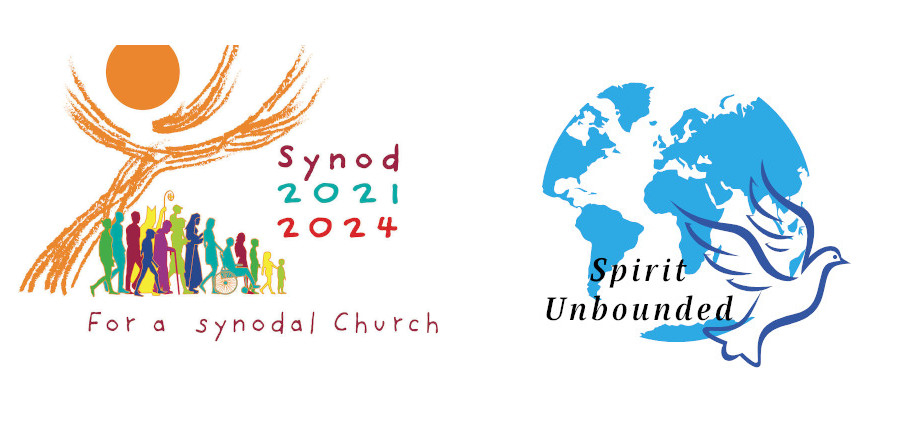Concrete Realities, Concrete Cries: Synod Report for October 10, 2023
“To homogenize is to clip the wings of the Spirit, to refuse to recognize that God is pleased with each person in a different and unique way,” Sr. Gloria Liliana Franco Echeverri, ODN, said last month while leading a retreat for the Encounter of the Lasallian Region of Latin America (RELAL) in Medellín, Colombia. “Today more than ever we are called to work with others, to build networks of collaboration in favor of projects in relation with life, with the defense of cultures, with the care of the Earth.”
Echeverri, a Sister of the Company of Mary, Our Lady, is the President of the Latin American Confederation of Religious Men and Women (CLAR). She is also a delegate to the Synod representing Latin America and the Caribbean. This morning she spoke at a press briefing alongside fellow delegate Cardinal Joseph Tobin about her experience thus far.
Describing the Synod as “a collective building experience,” Echeverri said that it is an opportunity to “make explicit the values of the gospels” and of “a Jesus who opens the door to the other.” She has felt among the delegates “a dignity that comes from respect and communion.”
Echeverri characterized the priorities of her small group as “listening to the cries of the poor” as well as those affected by migration and human trafficking.
She noted that the synodal process “must be translated into concrete action.” She said that “in the small groups, we have gone beyond theory,” and that delegates “are speaking of names, concrete realities, concrete cries.”
Cardinal Tobin also addressed this point, saying, “The church always has to be concerned with flesh-and-blood issues.” He called the current Synod “the most diverse Synod I’ve ever participated in” and spoke of the “complementarity” that has arisen through the variety of delegate voices.
In their small groups, delegates are currently discussing the second synodal module, on the theme of communion. The focusing question for the module is: “How can we be more fully a sign and instrument of union with God and of the unity of all humanity?”
“Unlike the first module, the groups do not all follow the same track, but each one tackles just one of the five worksheets that the Instrumentum Laboris sets out in Section B1,” Cardinal Jean-Claude Hollerich, the Synod’s General Rapporteur, explained to the delegates yesterday.
As with the previous module, the small groups are gathering into General Congregations to hear from each other and to provide space for individuals to respond. There will be three such General Congregations throughout the module. On Thursday morning, small groups will draft their final reports for submission to the General Secretariat.
Sr. Echeverri and Cardinal Tobin’s remarks on the need to concretize these synodal discussions, and to connect them to the person of Christ, put me in the mind of author and historian James Carroll’s testimony to the Spirit Unbounded “Human Rights in the Emerging Catholic Church” event yesterday.
In a prerecorded statement, Carroll said, “The church is an in-the-flesh connection to Jesus Christ, or it is nothing.”
Speaking directly to the hurt many Catholics have endured due to the abuse crisis and its cover-up, he said that “the connection to Jesus Christ has been continually betrayed by those entrusted with church governance.” He lamented the hierarchy’s preference for “the clerical status quo over the now obvious demands for justice, especially for Catholic women and for the victims of Catholic priests.”
Carroll ended with a call to action rooted in a spirit of radical solidarity: “More than of power brokers in Rome, we think continually of Jesus Christ. In the future I foresee the church will, with him, hunger and thirst for justice, as much within Catholicism as in the wider world.”
Carroll’s statement is just one of over 115 individual presentations featured this week for “Human Rights in the Emerging Catholic Church.” Today’s speakers include Sr. Anita Baird, Steven T. Newcomb and Shawna Bluestar Newcomb, Huda Khoury, and more. A complete event program is available here.
In addition to today’s report, we are pleased to feature this reflection by Sarita Melkon Maldjian, professor of the Core and the English departments at Seton Hall University, on women’s ordination. The subject is a crucial element in the Synodal Assembly and a key theme throughout the Spirit Unbounded presentations. ♦
Michael Centore
Editor, Today’s American Catholic




Thank you so much for these reports, Michael. They give me a flesh and blood appreciation for “discernment”– a very cerebral word for the spiritual direction and physical healing we need today in a war torn world. May the synod bring us together to bind up wounds and not to inflict them.